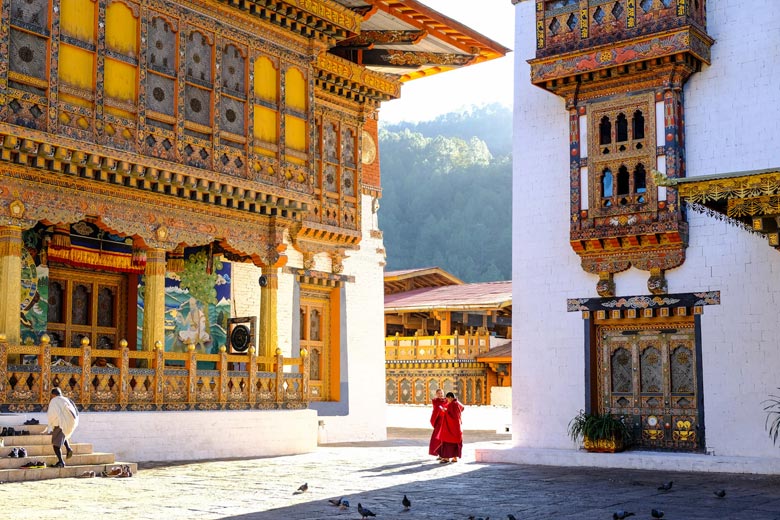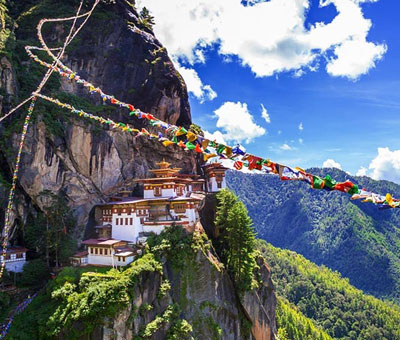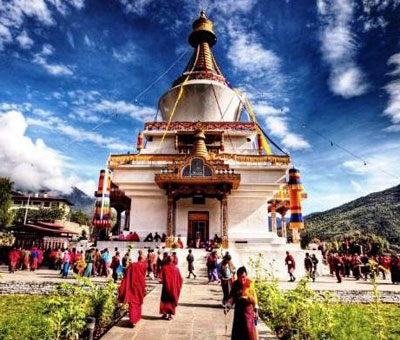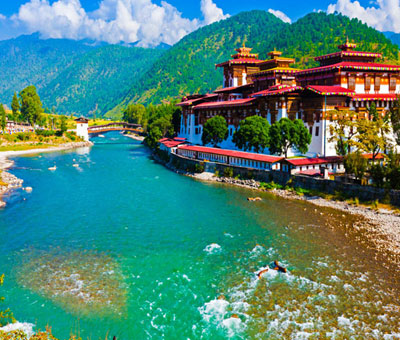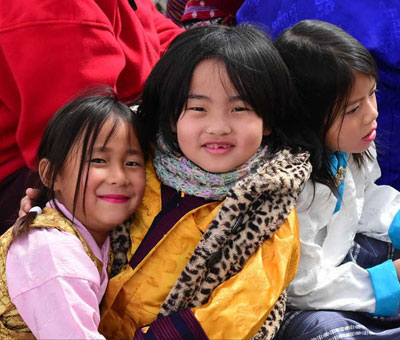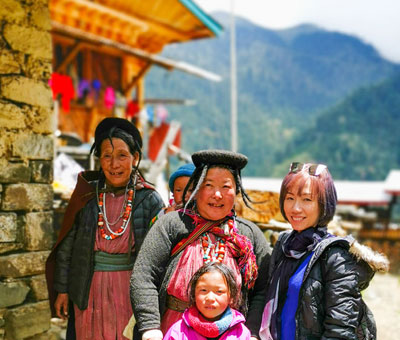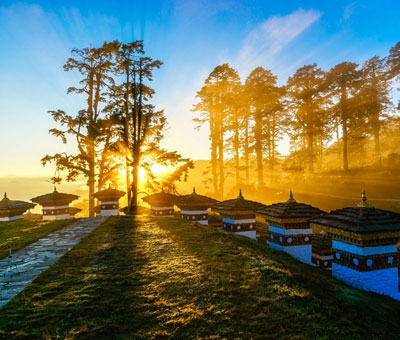Popular Sightseeing Places in Bhutan – Bhutan as a tourist destination is getting very popular in the recent times because of better air and road connectivity and easier immigration formalities. Bhutan tour packages include visit to Thimphu , Paro and Punakha and a guest can experience a visit to the monasteries, try local cuisine, indulge in adventure activities such as rafting, mountain biking, hiking, camping and much more.
Tourists see much of the countryside during the drive from Phuntsholing, the town of entry to Thimphu in the central high-lands. The road, built in the early sixties as one of the first priorities of the Five Year Development Plan, rises sharply to about 6,000 feet and remains at this level for some distance before eventually climbing to 9,500 feet at Chapchha. Traces of the old track used before the high-way was constructed (when the journey to Thimphu took an arduous five to six days by pony or mule) often appear below.
Bhutan Tour Packages
Pricing and Itinerary
The first town enroute Chima-kothi is about 75 miles- from Phuntsholing and has been developing into a bustling area. Fifteen miles from Thimphu the valley widens. Large square white washed houses built of com-pressed mud walls, stone, wood and clay and adorned with colourful motifs, are scattered among the fields. Their shingled roofs are held in place by heavy stones to prevent them being carried off by the strong winds which sometimes sweep through the valleys.
Here is list of 13 most popular sightseeing places in Bhutan:-
#1. The Dzongs
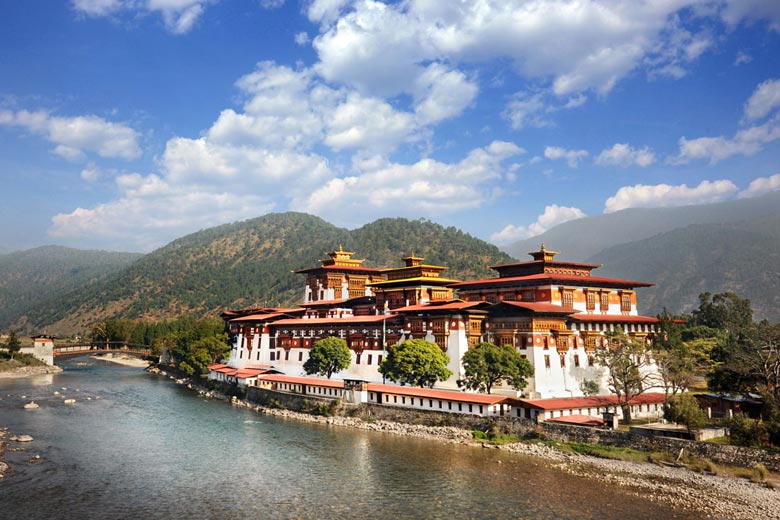
The Dzongs Bhutan
Many monasteries and forts were built on the hillsides surrounding the Thimphu Valley. At the en-trance, five miles from the capital, stands Simtokha Dzong, the country’s oldest (built by Nga-Wang Namgyal in 1627) where a track climb’s to about 10,000 feet into lush forest full of Himalayan birds.
#2. Confluence
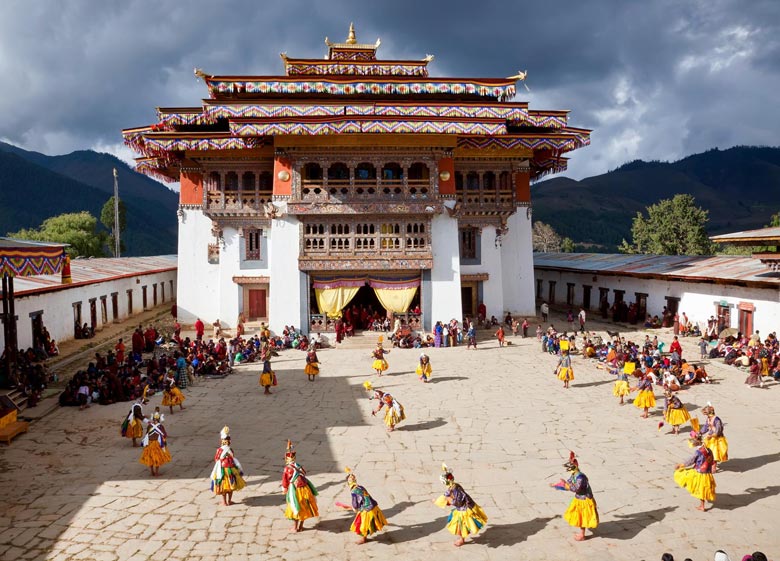
Confluence
In an area called “Chunzom“ (Confluence)— the meeting place of the Paro Chu and Wang Chu rivers—branch roads lead off to Thimphu, Paro and the Ha Valleys Ha was an important station in Bhutan’s once thriving trade with Tibet. Beyond it lays the Chumbi Valley of Tibet
Where to go phajoding To the west, the Phajpding Monastery overlooks the Thimphu town from 10,000 feet and commands a splendid view of the whole area Visitors may also go to Dongtsho La Pass for an impressive vista of snow peaks, lakes, streams and alpine flowers, and to Dochu La another scenic mountain pass, where the panorama of vivid rhododendrons and azaleas against the back-drop of the great Himalaya is breathtaking
#3. Paro Dzong – Best Sightseeing Place
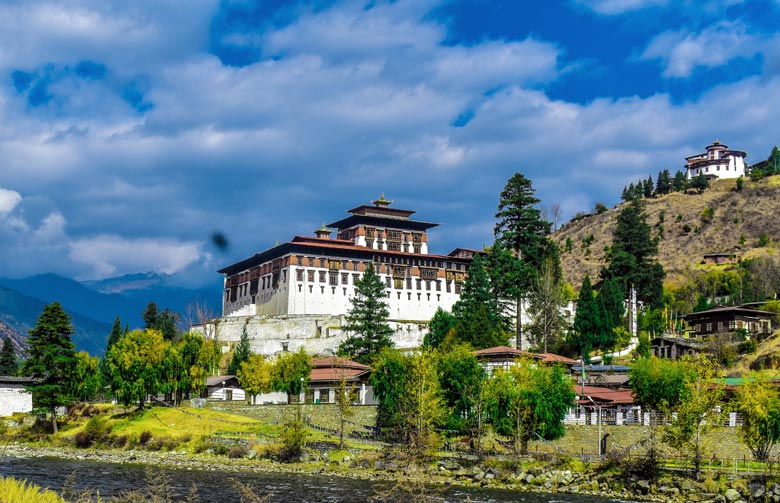
Paro Dzong Bhutan
It is about 15 miles from Confluence to Paro, the most beautiful of Bhutan’s valleys where the Paro Chu (River) meanders through a patchwork of rice paddies and wheat fields dotted with houses. On a hillside above the river stands the Paro Dzong, rebuilt after being destroyed by fire in 1907.
Its inner court is brilliantly carved and painted and the towering central keep “Uchi” is magnificent. Housed within the dzong is a collection of sacred masks, ritual objects and ornaments, some dating back several centuries.
#4. Ta Dzong – Explore The National Museum of Bhutan
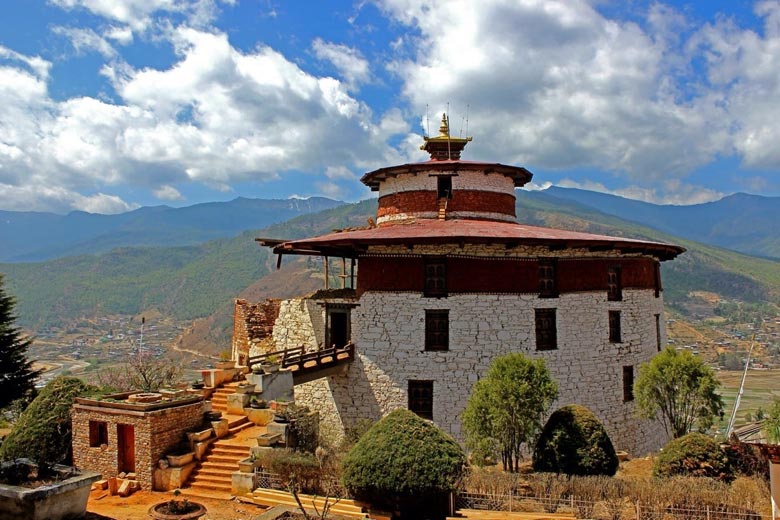
Ta Dzong Bhutan
On a steep ridge above the dzong is the Ta Dzong, an ancient watchtower which has, since 1967, housed the National Museum. The collection contained n that ancient building is a treasure house of sacred scroll, religious manuscripts, ancient weapons and other objects from Bhutan’s history.
#5. Ugen Pelri Palace
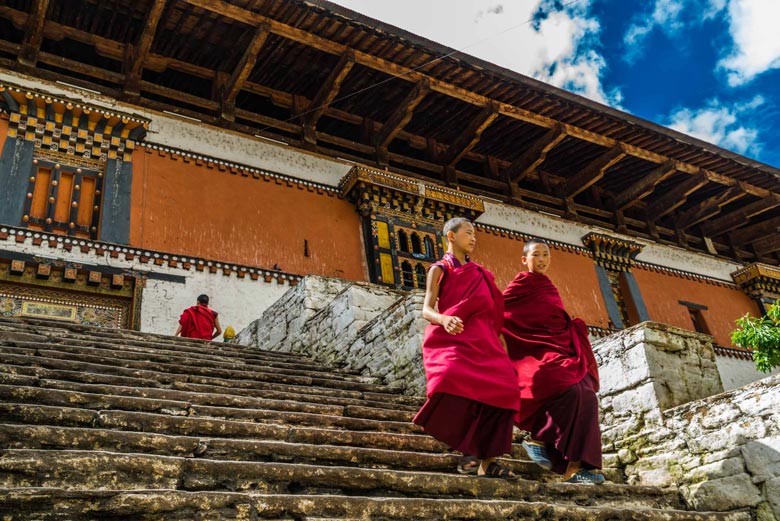
Ugen Pelri Palace Bhutan
Across a medieval bridge below the thong is the Ugen PeIn Palace. fashioned after the hea-venly abode of the revered Shab-drung Rimpoche
#6. Kunga Rabten palace
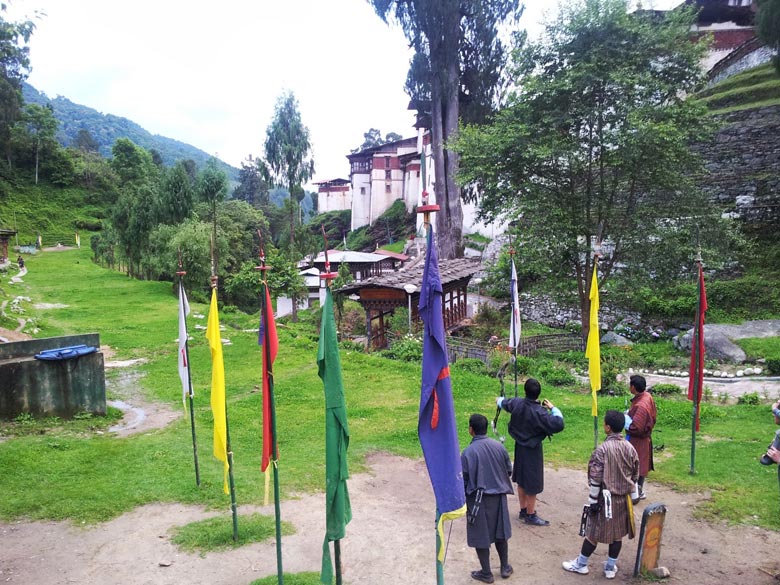
Kunga Rabten palace
Situated about 25 kms south of Tongsa, this beautiful mansion in traditional style was the winter palace of the second king of Bhutan Jigme Wangchuck (1926-62).
The palace can be seen even to-day in its serene environment. There is a small Industry processing Bhutanese paper.
#7. Drukgyel Dzong
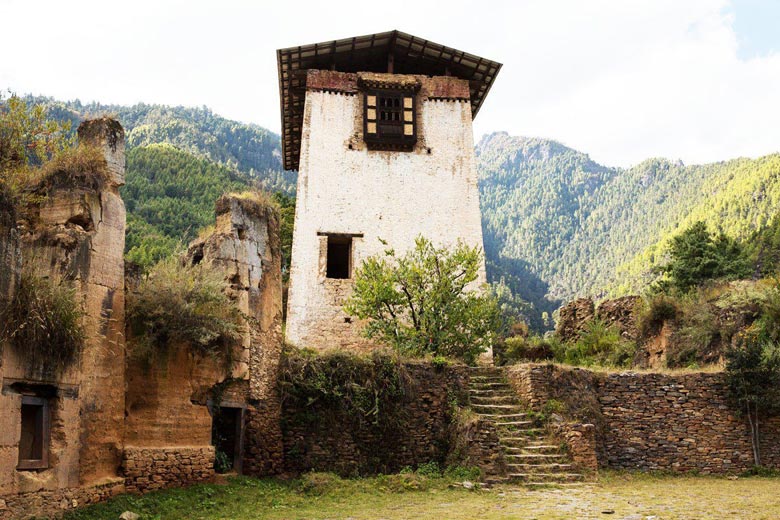
Drukgyel Dzong Bhutan
Further up the valley is the huge sprawling Drukgyel Dzong, once an important defence post against attacking armies from the north. (None of these 17th century invaders met with any success and Bhutan remained steadfastly inde-pendent of outside temporal and religious forces).
#8. Punakha – (The Old Capital)
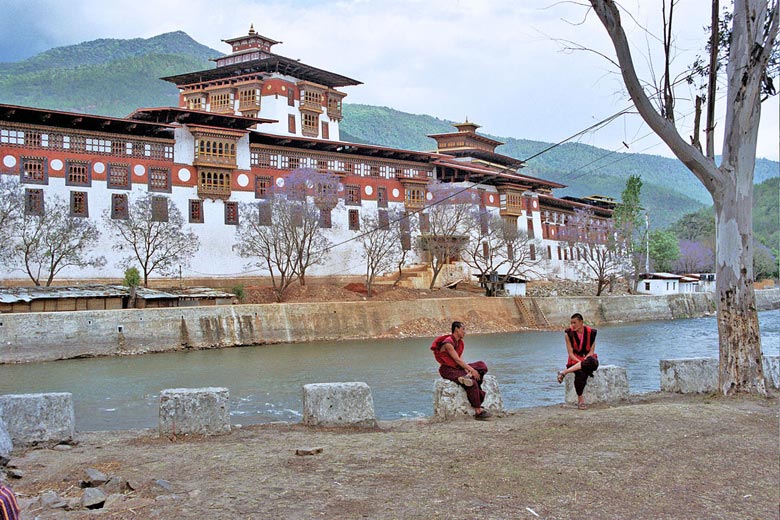
Punakha
A three-hour drive to the east of Thimphu takes one to the old capital of Bhutan, Punakha. A superb example of Bhutanese architecture, the Punakha Dzong majestically stands on the bank of River Punakha. With abundance of trouts, the Punakha River is considered an angler’s paradise.
#9. Wangdiphodrang Dzong
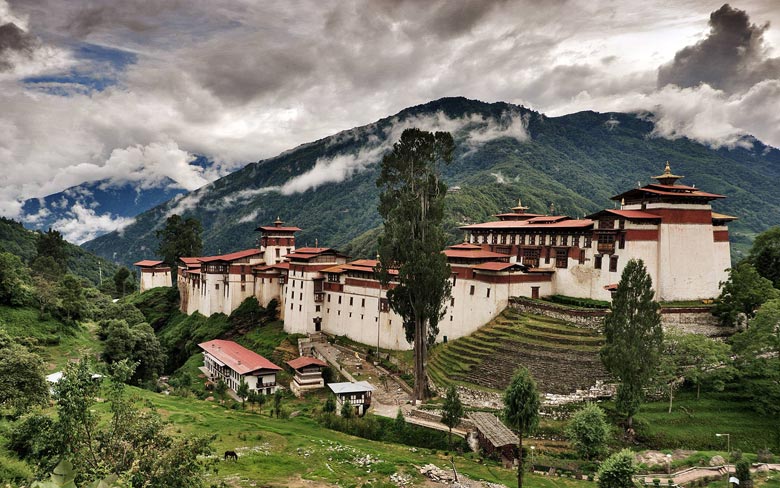
Wangdiphodrang Dzong
The Dzong perched on a hilltop at a confluence of two rivers commands the road to central and eastern Bhutan. It was built in 1638 by Shabdrung Nawang Namgyel Today it is the seat of the administrative headquarter of the Wangdi District and a state monastery.
#10. Tongsa Dzong
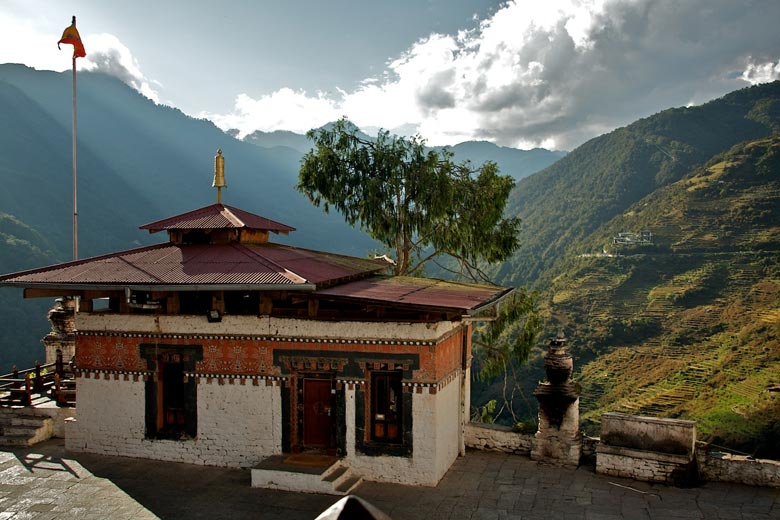
Tongsa Dzong
In the centre of Bhutan Tongsa Dzong is the most impressive dzong in Bhutan. It commands a superb view of the Mangde river valley and the passage between west and east. It was built in 1543 by the great grand-father of Shabdrung Nawang Namgyei, Ngagi Wangchuck. It was later enlarged in the 7th century AD by Chhoje Minjur Tenpa and is now a state-monastery and the headquarter of the Mangde District.
#11. Taktsang and Kyichu Monasteries
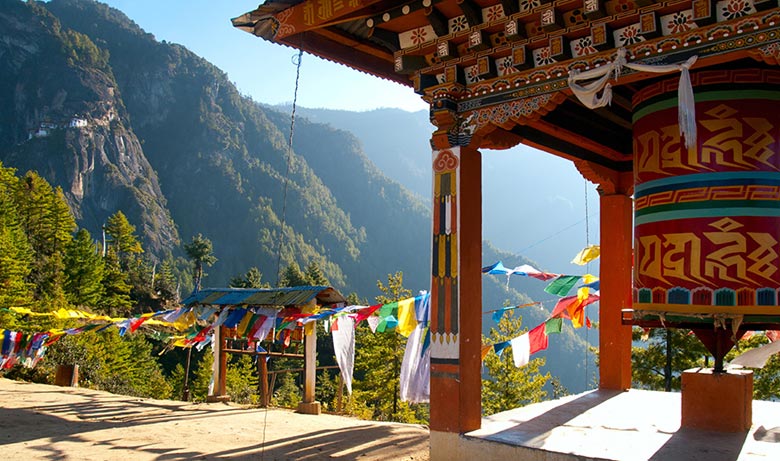
Taktsang and Kyichu Monasteries
In Paro Valley the road runs along the river to the North. From Paro bridge 4 miles to the North is one of Bhutan’s oldest and most sacred monasteries Kyichu Lhakhang—founded in 640 A. D. Another Jampel Lhakhang is in Bumthang Valley near Jakar Dzong.
A few miles further and down the road of Kyichu Lhakhang a small suspension bridge across the river leads towards Taktsang a gem-like monastery that clings to a sheer 3,000-foot rock cliff. The name means the “Tiger’s Nest” for the legend that Padma Sambhava the bringer of Buddhism or his manifestation flew here on the back of a tiger. Today, pilgrims and other ‘, visitors reach it by trekking through a steep winding track or on horseback.
Another 15 minutes further along, even higher than Taktsang, is the Sang-tog Peri Monastery. Its name literally means Heaven, a claim which no one who sees it would think to contest. In all the monasteries the caretaker monk welcomes visitors and will readily act as guides and even show their small sacred library. They are always willing to help and explain the significance of all the ancient frescoes and images of different deities.
#12. Jakar Dzong
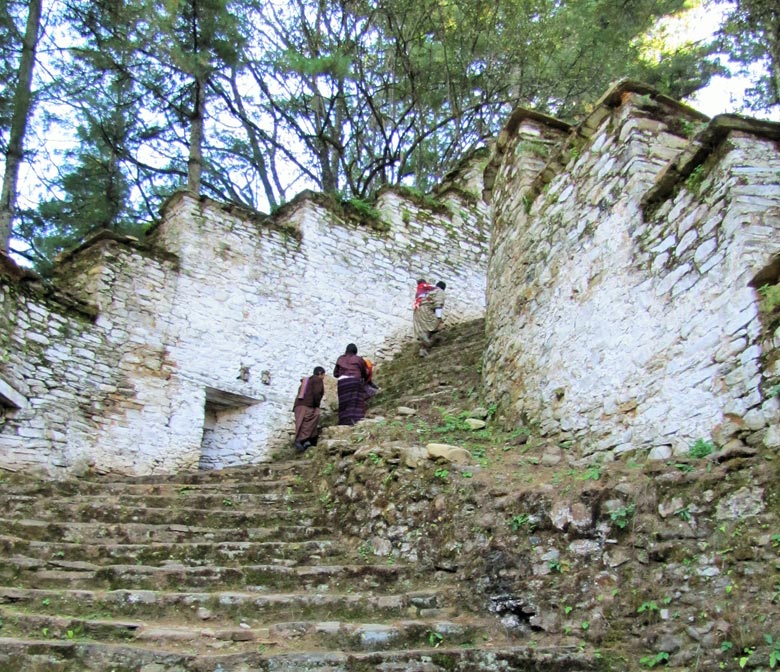
Jakar Dzong Bhutan
Like Tongsa, Jakar Dzong was built in the 16th century AD by Ngagi Wangchuck and restored by Chhoje Minjur Tenpa in the 17th century A.D. But the Dzong was destroyed in 1897 by an earthquake and by fire. It was totally rebuilt at the beginning of this century. Perched on a ridge in the centre of Bumthang Chhokhor valley, it houses the headquarter of the Bumthang District but contrary to other dzongs. there is no state-mo-nastery.
#13. Kuria Lhakhang
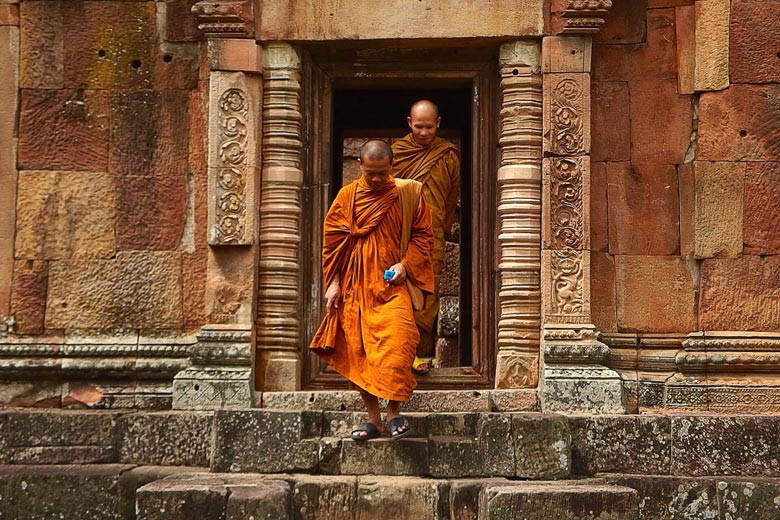
Kuria Lhakhang Bhutan
It is one of the most sacred temples in Bhutan. Guru Rimpoche meditated there in 8th century and captured back the “life force” of the King Sindhu Raja It is composed of two buildings, one built in 1652 by Chhoje Minjur Tenn& the other in 1900 by the first King of Bhutan, Ugyen Wangchuck,
Taktsang or the Tiger’s Nest built on a sheer rock and founded by Padma Sambhava In the 8th century. The famous teacher Milarepa composed a few verses of his hundred thousand songs after three months of retreat in this shrine in the 12th century A D.
Bhutan tour packages from Delhi customized by Swan Tours include return air tickets to Paro, return airport transfers in Bhutan, intercity transfers, local sightseeing , accommodation at quality hotels and resorts, services of a certified tourist guide and unique Bhutanese cultural experiences.
For more information on trip to Bhutan contact Swan Tours, one of the leading travel agents in India.
